 |
1946 |
July 6 | George Walker Bush is born to George Herbert Walker and Barbara Bush in New Haven, CT, where his father is attending Yale University. George W. is the first of six children. |
 |
1948 |
Spring | George Sr. moves his family to Midland, Texas after graduation to make his fortune in the oil business. In Midland, George W. attends Sam Houston Elementary School and San Jacinto Junior High. |
 |
1953 |
Oct 11 | George's younger sister Robin dies from leukemia. Seven-year-old George takes on the task of trying to cheer up his mother. |
 |
1959 |
The Bush family moves to Houston to further George Sr.'s business and political prospects. |
 |
1961-1964 |
George W. attends Andover, a Massachusetts prep school where his father had been a legendary student leader and athlete. Nicknamed "Lip," George W. is known across campus for his extracurricular activities as a cheerleader and organizer of an intramural stickball league.
» For more on Bush's early years, see FRONTLINE's interviews with Randall Roden and John Ellis from "The Choice 2000." |
 |
1964 |
Summer |
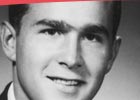
George W. works on his father's Senate campaign in Texas. George Sr. runs as a Goldwater Republican and campaigns against the Civil Rights Act. He is overwhelmingly defeated after being portrayed by his opponent as a carpetbagger and a member of the Northeastern elitist establishment. |
Fall | George W. enters Yale University, alma mater of his father, grandfather and several uncles. A "C" student, he makes a name for himself as a likeable guy and gets elected president of the hard-partying Delta Kappa Epsilon fraternity and is tapped for Skull and Bones. But he's a prankster and once is arrested on a misdemeanor.
» More on Bush at Yale. |
 |
1968 |
May | Just before his Yale graduation, George W. applies to the Texas Air National Guard. A former Texas Lt. Governor, Ben Barnes, says he was asked by a now deceased Bush family friend to help smooth the way. Bush is accepted into the 147th Fighter Group. He will be enrolled in the Guard for the next six years. |
Nov 26 -- Dec 2 | 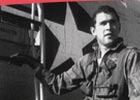
After basic training over the summer of 1968 and work on Florida Senator Edward Gurney's campaign, George W. attends undergraduate pilot training with the 3559th Student Squadron, Moody Air Force Base in Valdosta, Georgia. He is trained to fly standard Air Force aircraft, including the T-31, T-37 and T-39. |
 |
1970 |
George W. splits his time between his National Guard duties and his father's second Senate campaign where he works on rallying the youth vote. But, despite support from President Nixon, his father is defeated by Lloyd Bentsen. |
 TEXAS YEARS  |
Summer | 24-year old George W. graduates from Combat Crew Training School. He is required to log one weekend of duty per month at Ellington Air Force Base in Houston. He moves into the Chateaux Dijon apartment complex in Houston and spends the next few years working at a series of jobs in politics and business. |
 |
1971 |
George Sr. is named U.S. Ambassador to the U.N. by President Nixon. |
 |
1972 |
May | 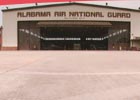 George W. heads to Alabama to be political director on Winton "Red" Blount's senate campaign. Obligated to continue his military service, he applies for a transfer to the Alabama National Guard and is assigned to the 187th TAC Recon Group in Montgomery. Reports differ on whether Bush fulfilled his flight duty with the 187th. Some pilots don't recall ever seeing Bush there.
George W. heads to Alabama to be political director on Winton "Red" Blount's senate campaign. Obligated to continue his military service, he applies for a transfer to the Alabama National Guard and is assigned to the 187th TAC Recon Group in Montgomery. Reports differ on whether Bush fulfilled his flight duty with the 187th. Some pilots don't recall ever seeing Bush there.
|
July | After failing to show up for a required physical, Bush loses his flying status. |
November | Red Blount loses his bid for the Senate and George W. returns to Houston. |
 |
1973 |
Summer | Bush applies for and gets an early honorable discharge from the Guard and enrolls at Harvard Business School. Former Harvard classmates remember him as popular and irreverent. To escape liberal anti-Nixon Cambridge, Bush spends much of his spare time with relatives in the Northeast. |
 |
1974 |
September | George Sr. is named Chief of U.S. Liaison Office to China, a month after President Nixon resigns. |
 |
1975 |
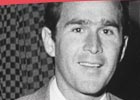
George W. graduates from Harvard with an MBA and returns to Midland to make his fortune. The oil business is booming and he works as a landman, meeting with landowners and trying to secure rights to drill for oil on their property. But after a few years without much success he turns to the other family business - politics. |
 |
1977 |
July | George W. decides to run for Congress. A month later, at a barbeque, friends introduce him to school librarian Laura Welch. |
November 5 | George W. Bush marries Laura Welch at the First United Methodist Church in Midland. They immediately get back on the campaign trail where Bush is at ease connecting with people and raising money. |
 |
1978 |
November | 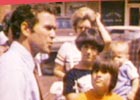
Bush wins the Republican primary but is beaten in the general election by Democrat Kent Hance who paints Bush as an outsider with a privileged Northeastern education. He goes back to the oil business. |
 |
1979 |
March | Bush's Arbusto Oil company begins operations. Although the Bush name attracts many investors, most lost money due to Arbusto's average performance. |
 |
1980 |
July | George Bush Sr. accepts Ronald Reagan's offer to be his vice presidential running mate. Reagan goes on to defeat President Carter in the election. |
 |
1981 |
Nov 25 | 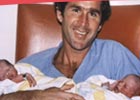
Laura Bush gives birth to twins Barbara Pierce Bush and Jenna Welch Bush.
But George W. is still drinking, isn't making enough money and family and friends are worried. It isn't clear where he is headed. |
 |
1982 |
Arbusto Oil changes its name to the more promising-sounding Bush Exploration Company and goes public. But the price of oil began to drop. Bush has more and more difficulty finding investors. |
 |
1984 |
February 29 | Bush Exploration Company merges with Spectrum 7; George W. is named chairman and CEO of the new company. |
April 3 | Bush meets privately in Midland with Arthur Blessit, a traveling evangelist famous for walking long distances while carrying a wooden cross. According to Jim Sale, a Midland friend who was there at the meeting, Bush undergoes a religious conversion, accepting Jesus as his personal savior. |
 |
1985 |
Summer | 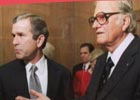
At the Bush family compound in Kennebunkport, Maine, George W. spends time with family friend Billy Graham, who inspires him to become even more serious about his faith. Back in Midland that fall, he starts attending Bible study.
» More on Bush's bible study in FRONTLINE's "The Jesus Factor." |
 |
1986 |
July 6 | Celebrating his 40th birthday with friends at the Broadmoor Hotel in Colorado Springs, George W. drinks too much and the next morning decides to quit drinking for good. |
September | Harken Oil and Gas buys Spectrum 7. George W. joins Harken's board and becomes a consultant to the company. |
 |
1987 |
April | George W. moves his family to Washington D.C. to work on his father's presidential campaign and he starts to realize the growing political clout of the religious right. As a born again Christian himself, he becomes an asset to his father, campaigning across the country and rallying the conservative Christian vote. His father wins the Republican presidential nomination. |
 |
1988 |
November 8 | George Herbert Walker Bush is elected president. George W. returns to Texas and considers a run for Texas governor, but then decides against it. |
 |
1989 |
April 21 | 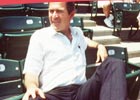
George W. joins a group of investors to buy the struggling Texas Rangers franchise. As managing general partner, he becomes the organization's public face as it works to secure a deal to build a new stadium -- a deal that will generate some controversy because the stadium is to be built on seized land and paid for with a local sales tax. Bush sees the $135 million referendum through to its approval and the ballpark in Arlington opens in 1994. |
 |
1992 |
November | George Sr. loses his reelection bid to Bill Clinton. Unlike in 1988, when George W. was active in mobilizing the religious right to elect his father, he doesn't play as large a role in his father's 1992 campaign. |
 |
1993 |
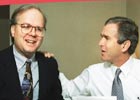
Riding on his popularity as an owner of the Texas Rangers, George W. announces he'll challenge Texas governor Ann Richards in 1994. Political strategist Karl Rove (pictured), who helped convince Bush to run, joins his team along with campaign director Joe Allbaugh and communications director Karen Hughes. The Texas press corps starts referring to the trio as Bush's "iron triangle." |
 |
1994 |
November | Bush is elected governor with 53 percent of the vote after running a tough, disciplined campaign, holding his own in the debate with Richards and emphasizing social conservatism and Richards's failure to curb juvenile crime. Bush sells his share of the Texas Rangers, netting a profit of over $10 million. |
 |
1995 |
January 17 | Bush takes office as Governor of Texas. He develops a solid relationship with the Democrat-controlled state legislature and passes education reforms and large tax cuts. He also develops a reputation as a decisive administrator.
» More on Bush as governor. |
 |
1998 |
April | Bush travels to Palo Alto, Calif., and the Hoover institution, a conservative think tank at Stanford University. While in California, he is invited by George Shultz to a meeting at Shultz's home to talk with various policy experts, including Michael Boskin, John Taylor and Condoleeza Rice. They are looking for a presidential candidate for 2000 with good political instincts -- someone they can work with. |
Fall | The meetings between Bush and the policy experts continue in Austin, where Bush is doing well raising money for his as-yet unofficial campaign. Aware of the sizeable conservative Christian vote, he also is meeting with religious leaders. |
November 3 | Bush wins a second term as governor with 69 percent of the vote, defeating Garry Mauro. |
 |
1999 |
Mar 2 | Bush announces he is forming a presidential exploratory committee and in June declares he is a candidate for president. He announces that he has raised $36.3 million during the first six months of 1999, nearly triple the record, and about twice as much as Al Gore. |
 |
2000 |
Jan 24 | Bush wins the Iowa caucus, but a week later loses the New Hampshire primary by 18 points to Senator John McCain. |
Feb 3 | Bush appears in front of television cameras next to Thomas Burch, a Vietnam veteran who had led harsh attacks on Bush's father over the POW issue. Burch accuses Senator McCain of betraying veterans. By now it's clear that Bush is running a well-organized and aggressive campaign with the full support of the Republican establishment. |
February 19 | Bush wins the South Carolina primary by a 10-point margin and goes on to beat McCain in nine of 13 states on Super Tuesday. By March, Senator McCain has dropped out of the race. |
Summer | Bush selects Dick Cheney as his running mate and accepts the Republican presidential nomination. His Democratic challenger is Vice President Al Gore. |
November 7 | Election Day. By evening it's clear that the final election tally hinges on Florida. But it will be 36 days before the final Florida vote is known. |
December 13 | Vice President Gore concedes and George Bush wins the 2000 presidential election. |
 WHITE HOUSE YEARS  |
2001 |
January 20 | 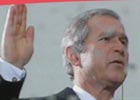
George Walker Bush is sworn in as 43rd president of the United States.
» President Bush's inaugural address |
January 29 | In the first of several bold domestic policy moves, Bush signs an executive order creating the White House Office of Faith-Based and Community Initiatives which allows smaller organizations with more overt religious affiliations to receive government funding for social improvement.
» See more on faith-based initiatives in FRONTLINE's "The Jesus Factor" report. |
February 8 | Bush sends Congress a $1.6 trillion, 10-year tax-cut plan arguing that fast, broad-based tax relief is necessary to boost a slowing economy. |
February 27 | Bush outlines his $1.96 trillion budget proposal for fiscal year 2002 to a joint session of Congress. Much of his address is focused on his tax cut proposal. His budget calls for increased spending in education and Medicare, while restraining overall spending growth and paying down portions of the national debt. |
May 1 | In a speech at the National Defense University in Washington, DC, Bush outlines plans to develop and deploy a national missile defense shield. Bush stops short of explicitly withdrawing from the 1972 Antiballistic Missile treaty with Russia, but he says there is a need to move beyond the "adversarial legacy of the Cold War" and "replace this treaty with a new framework that reflects a clear and clean break from the past." |
May 23 | In reaction to Bush's policies, Senator James Jeffords announces he will change his party affiliation from Republican to Independent, thereby eliminating the Republican majority in the Senate. |
May 26 | The House and Senate give final approval to a $1.35 trillion tax-cut package. It contains the major elements of President Bush's tax-relief program. |
June 28 | A Wall Street Journal/NBC News poll gives President Bush a 50 percent approval rating, the lowest presidential approval rating in more than five years. |
August 2 | The House approves a version of a patients' bill of rights supported by the White House. The plan includes a limited right for individuals to sue health plans in state courts. |
August 9 | In a televised address to the nation, Bush announces that he will permit federal funding of limited research on human embryonic stem cells. Bush says he will support federally funded research on the 60 embryonic stem cell lines already produced, but not allow research using embryos currently stored in fertility clinics or embryos created specifically for experimentation.
» Read the President's remarks. |
September 11 | As the terrorist attacks are underway, President Bush is visiting with a third grade class in Florida. He makes a brief public statement, flies to Barksdale Air Force Base in Louisiana, where he makes a second public statement, and then flies to Offutt Air Force Base in Omaha, Neb., where he holds a meeting of the National Security Council by video telephone. Returning to Washington in the evening, Bush addresses the nation, saying, "Terrorist attacks can shake the foundations of our biggest buildings, but they cannot touch the foundation of America." |
September 14 | 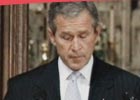
Bush attends a multi-faith prayer service at the National Cathedral as part of a "National Day of Prayer and Remembrance," declaring, "The conflict was begun on the timing and terms of others. It will end in a way and at an hour of our choosing."
The Senate votes 98-0 and the House votes 420-1 to authorize Bush to use "all necessary and appropriate force" to retaliate against the terrorists. Bush authorizes a call-up of 50,000 reservists for "homeland defense." |
September 20 | Bush addresses a joint session of Congress and outlines his campaign against terrorism. He announces a new cabinet-level agency, the Office of Homeland Security, to be headed by Pennsylvania Governor Tom Ridge. |
October 7 | The U.S. and Britain launch air strikes against Afghanistan's ruling Taliban and the Al Qaeda terrorist network. Bush addresses the nation in a televised address shortly after the attacks began, saying, "The battle is now joined on many fronts. We will not waver, we will not tire, we will not falter, and we will not fail." |
October 19 | U.S. Special Forces launch the first ground raids in Afghanistan. |
November 13 | Kabul falls after Northern Alliance troops seize control of the Afghan capital. Bush signs an order authorizing the use of military tribunals to try foreign nationals accused of terrorism. |
December 13 | Bush announces that the U.S. will withdraw from the 1972 Antiballistic Missile Treaty between the U.S. and Russia. It is the first time in the nuclear era that the U.S. has withdrawn from a major arms control treaty. |
 |
2002 |
January 8 | Bush signs a sweeping education reform measure into law. One of his top domestic priorities, the measure requires new math and reading tests as well as higher standards for teachers. |
January 10 | In a Pentagon ceremony, Bush signs a $317.2 billion defense bill, which includes pay raises for troops, funding for new weapons systems and an increased budget for national missile defense. |
January 29 | 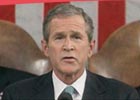
Bush delivers his first State of the Union address, calling North Korea, Iran and Iraq "an axis of evil." On the domestic front, Bush pledges to fight recession and create jobs.
» Read the text of President Bush's Jan. 29, 2002 speech. |
February 4 | Bush sends Congress a $2.13 billion budget that includes significant increases in military spending. The president claims that the increases are needed to fight the war on terrorism. Democrats counter that the budget slights domestic needs and will lead to deficits. |
February 12 | Secretary of State Colin Powell testifies before the Senate that the Bush administration is settling on a plan for "regime change" in Iraq. |
June 14 | At a reception for Texas governor Rick Perry, Bush calls preemptive action against potential enemies a "new doctrine."
» Read the president's remarks. |
August | German chancellor Gerhard Schröder says his country won't participate in a U.S.-led war in Iraq. He is running for reelection in Germany. |
September 3 | Prime Minister Tony Blair of Britain says he will support U.S. military action against Iraq, saying the atrocities committed by the current Iraqi regime are an issue that should concern the world. |
September 12 | Bush takes his case against Iraq to the United Nations. In a speech before the General Assembly, he asserts that world leaders must force Saddam Hussein to destroy his weapons of mass destruction, or action to depose him will be "unavoidable." |
September 19 | Bush asks Congress for authority to disarm Iraq. |
October 11 | The Senate approves use of US military force against Iraq. The House approved the resolution the day before. |
October 16 | Bush signs the resolution authorizing the use of force against Iraq. He says world leaders must "face up to our global responsibility" to confront Saddam Hussein. |
November 5 | Republicans regain the Senate and add six seats to their margin in the House. GOP wins are seen as a major victory for Bush, who had spent the previous 3 weeks aggressively campaigning. |
November 8 | The UN Security Council unanimously approves 1441, a new resolution warning of "serious consequences" if Iraq fails to comply with strict new weapons inspections. The Bush administration promises "zero tolerance" if Iraq does not disarm. |
November 22 | Bush administration eases clean-air rules for utilities and industry. |
November 25 | Bush signs the Homeland Security Act, creating a new Department of Homeland Security to fight against domestic terrorism. The cabinet-level department oversees agencies responsible for keeping the country secure. |
 |
2003 |
January 27 | After chief weapons inspectors testify at the U.N. that Iraq has not been fully cooperating with them, the Bush administration dismisses Iraq's response to U.N. disarmament demands as inadequate. |
March 19 | The war in Iraq begins. In a televised address from the Oval Office, Bush states, "We have no ambition in Iraq," he says, "except to remove a threat and restore control of that country to its own people."
» Read the president's March 19, 2003 address to the nation. |
March 21 | House approves $2.2 trillion budget embracing Bush's tax-cutting plan. |
May 1 | Bush lands in a fighter jet aboard the U.S.S. Abraham Lincoln, an aircraft carrier off the coast of San Diego. He declares major combat over in Iraq. |
July 21 | In an appearance with Italian Prime Minister Silvio Berlusconi, President Bush asks other nations to help in Iraq; he also accuses Syria and Iran of harboring terrorists.
» Read the president's remarks. |
July 30 | At a news conference held in the White House Rose Garden, President Bush is asked about his view on homosexuality. He says he is exploring legal steps to define marriage as a union between a man and a woman. |
September 7 | In a televised address to the nation, President Bush announces he will soon request an $87 billion spending package from Congress for the rebuilding of Iraq. Democrats demand details of Iraq operations as condition for the package, contrasting the war's cost with funds allocated to domestic needs. |
November 5 | President Bush signs the Partial Birth Abortion Act, a bill outlawing a type of procedure used to terminate a pregnancy in the second or third trimester. It is the first law limiting abortion since Roe v. Wade.
» Read the president's remarks at the bill signing. |
November 6 | President Bush signs the $87 billion spending package for Iraq and Afghanistan after it is passed by Congress. |
December 8 | President Bush signs a Medicare overhaul that includes a prescription drug plan for seniors. It meets a promise he made during his 2000 campaign and will cost $400 billion over ten years. |
December 14 | U.S. announces it has captured Saddam Hussein. The President's approval rating rises six percentage points, according to a New York Times/CBS News poll. |
December 19 | Bush announces that Libya has committed to disarming its nuclear, chemical, and biological weapons. He since has cited this development as a sign that his policies in the war on terror are working. |
 |
2004 |
February 24 | Bush calls for a constitutional amendment that would define marriage as the union between a man and a woman. In his statement, he says "Marriage cannot be severed from its cultural, religious and natural roots without weakening the good influence of society." Democrats accuse the president and Republicans of trying to divide the country during an election year.
» Read the president's full statement. |
June 28 | 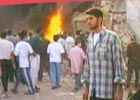
The United States transfers political authority to an interim Iraqi government in a five-minute surprise ceremony that was conducted two days early because of security concerns. Throughout the summer and autumn the insurgency against the U.S.-led forces in Iraq will continue to build. |
July 22 | The 9/11 Commission releases its report. It recommends a restructuring of the nation's intelligence agencies under a cabinet-level administrator. In response, the White House releases a statement in July 30 outlining the ways the administration has already set out to fulfill the commission's recommendations. |
September 2 | President Bush accepts the Republican Party's nomination at the Republican National Convention in New York City. |